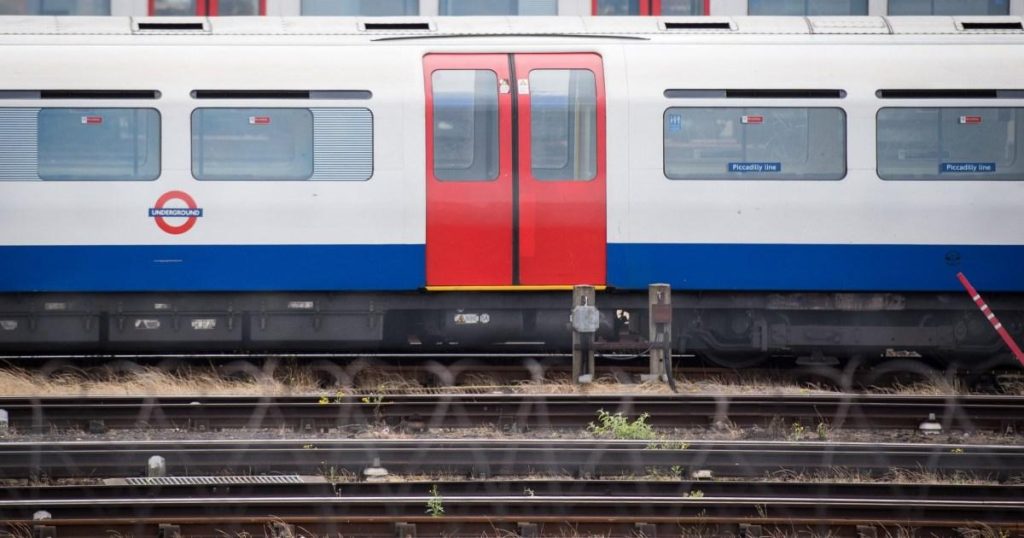The Piccadilly line, a vital artery of the London Underground, experienced significant disruptions in late 2023 and early 2024 due to an unusually heavy leaf fall. This natural phenomenon, which annually affects railway systems across the UK, caused unprecedented damage to the Piccadilly line’s aging rolling stock. The fallen leaves created slippery conditions on the tracks, leading to a phenomenon known as “wheel flats.” This occurs when train drivers apply the brakes, but the wheels slide on the leaf-covered tracks instead of gripping, causing flat spots to develop on the wheels through erosion. The section of the line between Rayners Lane and Uxbridge was forced to close for several weeks, leaving commuters in Uxbridge without a direct Tube connection just before the Christmas holiday period.
The impact of the leaf fall was exacerbated by the age of the Piccadilly line trains. Unlike newer trains equipped with anti-slide technology, the current Piccadilly line carriages are over 50 years old, making them particularly susceptible to wheel flats. With a significant number of trains requiring repairs, Transport for London (TfL) was forced to reduce service between Acton Town and Rayners Lane, effectively severing the connection to Uxbridge. Passengers relying on this section of the line were forced to seek alternative transportation methods, adding considerable inconvenience to their daily commutes. The situation highlighted the vulnerability of the aging Piccadilly line infrastructure to seasonal challenges.
The disruption underscored the urgent need for the planned Piccadilly line upgrade, which includes the introduction of 94 new, modern, air-conditioned trains in 2025. These new trains will be equipped with advanced braking systems and other technologies designed to mitigate the impact of leaf fall and other adverse weather conditions. TfL acknowledged the disruption caused by the extended closure and apologized to affected passengers. The organization emphasized its commitment to implementing a robust annual action plan to manage leaf fall, which includes trackside vegetation clearance, reduced train speeds in known leaf-fall hotspots during the autumn months, and the deployment of specialized trains to treat the rails. However, the severity of the 2023 leaf fall overwhelmed these preventative measures.
While the closed section of the Piccadilly line is anticipated to reopen by late January 2024, further disruptions are expected due to the ongoing upgrade works. TfL has announced a series of weekend and Night Tube closures throughout the coming months to facilitate the modernization project. These closures will affect various sections of the Piccadilly line, including stretches between Hyde Park Corner and Cockfosters, King’s Cross St. Pancras and Cockfosters, King’s Cross St. Pancras and Osterley/Uxbridge, Hyde Park Corner and Osterley/Uxbridge, Wood Green and Cockfosters, Acton Town and Uxbridge, Hyde Park Corner and Acton Town, Osterley and Cockfosters, Cockfosters and Heathrow/Uxbridge, King’s Cross St. Pancras and Osterley/Uxbridge, and Hammersmith and Cockfosters. Passengers are advised to consult the TfL website and travel information boards for the most up-to-date information on closures and alternative travel arrangements.
The extensive closure list underscores the complexity and scale of the Piccadilly line upgrade. The project will require significant track work, signal upgrades, and station improvements in addition to the introduction of the new trains. While the disruptions will undoubtedly cause inconvenience to passengers, they are essential for ensuring the long-term reliability and efficiency of the Piccadilly line. The modernization project will ultimately enhance the passenger experience by providing more frequent, reliable, and comfortable journeys. The new trains will also increase capacity on the line, addressing the chronic overcrowding issues that have plagued the Piccadilly line for years.
The challenges faced by the Piccadilly line highlight the ongoing tension between maintaining aging infrastructure and investing in necessary upgrades. While TfL has implemented various preventative measures to manage leaf fall, the age of the current rolling stock ultimately made the line vulnerable to significant disruption. The 2023 leaf fall served as a stark reminder of the need for continued investment in the London Underground to ensure its resilience and capacity to meet the growing demands of the city’s population. The upcoming modernization project represents a significant step towards a more modern and reliable Piccadilly line, but it also necessitates short-term disruptions for long-term gains. Passengers are encouraged to remain informed about planned closures and to plan their journeys accordingly.


